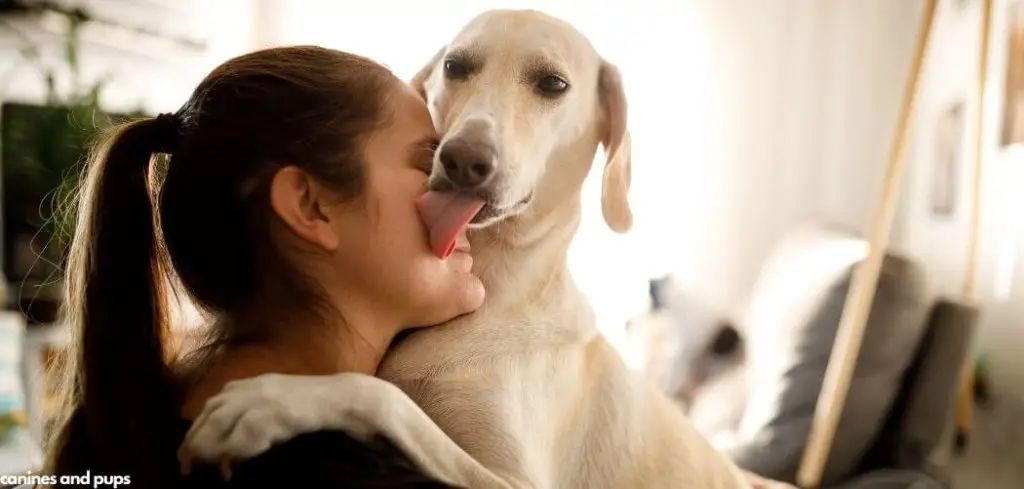It can be concerning and disruptive when your dog licks you excessively at night. While the behavior might seem like a sign of affection, persistent nighttime licking often points to underlying physical or emotional issues.
We outline the common reasons why your dog excessively licks you at night, what you can do, and when to seek veterinary help.
Table of Contents
Dog Licking Me Excessively at Night — Why It Happens
When your dog excessively licks you at night, it’s usually linked to stress, discomfort, or underlying health problems. Anxiety, skin irritation, gastrointestinal upset, or even changes in routine can trigger this behavior. Sometimes, older dogs develop nighttime restlessness due to cognitive decline, which may manifest as repeated licking.
While it can look like a quirky habit, it often indicates that something deeper is affecting your dog’s wellbeing.

Dog Licking Me Excessively at Night: Common Causes
Anxiety and Stress
Dogs often lick as a self-soothing behavior when anxious. Nighttime can be particularly stressful if they feel separation anxiety when the household is quiet or if there are changes in their environment.
You might notice your dog pacing, whining, or panting in addition to licking you excessively at night. Left unaddressed, stress-related licking can become a nightly cycle.
Read more: Old Dog Excessively Licking Me (Here’s Why)
Allergies and Skin Irritation
Environmental or food allergies can cause itching and discomfort, leading dogs to lick both themselves and their owners.
At night, when they’re less distracted, that irritation might feel worse, causing them to turn to you for relief.
If your dog licks you excessively and you also notice scratching, red skin, or recurring ear infections, allergies could be playing a role.
Gastrointestinal Upset
Stomach discomfort is another common cause. Dogs may lick excessively when nauseated or experiencing acid reflux, as the behavior can help them cope with queasiness.
At night, digestive issues may be more noticeable if they haven’t eaten in several hours or if they ate something that didn’t agree with them earlier in the day.
Pain or Discomfort
Underlying pain—such as arthritis, joint stiffness, or an injury—can also drive nighttime licking.
Dogs sometimes redirect their discomfort into repetitive behaviors, including licking their owners.
Older dogs in particular may struggle more at night when their bodies are at rest, making pain-related licking more prominent.
Cognitive Dysfunction (Canine Dementia)
In senior dogs, nighttime licking may be linked to canine cognitive dysfunction, similar to dementia in humans.
This condition often causes restlessness, confusion, and changes in nighttime behavior.
A once calm dog may suddenly start licking you excessively at night as a way of coping with confusion or disorientation.
Learned Behavior and Attention-Seeking
Sometimes, licking simply becomes a reinforced behavior. If your dog licks you at night and you respond—by petting them, talking to them, or shifting in bed—they may learn that this gets them attention.
Over time, this turns into a nightly ritual, even if no medical issue is present.
What to Do If Your Dog Is Licking You Excessively at Night
The first step is to observe patterns. Take note of when the licking starts, how long it lasts, and whether other symptoms accompany it.
If stress seems to be the cause, creating a calming nighttime routine with gentle play, exercise earlier in the day, and a quiet environment may help. Providing a comfortable bed close to you can reduce anxiety-driven licking.
If allergies or skin irritation are suspected, discuss possible food triggers or environmental changes with your vet.
Regular grooming and hypoallergenic bedding can also ease discomfort. For dogs with stomach issues, offering a small bedtime snack approved by your veterinarian may settle their digestion.
Pain-related licking should always be evaluated by a professional.
If your dog is older and showing signs of arthritis, supplements or prescribed pain relief can make a big difference.
For cognitive dysfunction, veterinarians may recommend special diets, medications, or supplements that support brain health, along with maintaining a consistent routine.
In cases where licking has become a habit, gentle redirection helps. Encourage them toward a chew toy or calming activity instead of reinforcing the behavior by reacting to it every time.
When to Call or Visit Your Vet
If your dog’s nighttime licking is persistent and paired with other concerning signs, it’s best to schedule a veterinary checkup.
Watch for additional symptoms such as vomiting, diarrhea, limping, persistent scratching, weight loss, or sudden changes in behavior.
Excessive licking that appears suddenly or worsens quickly should not be ignored. Likewise, if your senior dog is restless at night, confused, or showing signs of disorientation along with licking, veterinary guidance is crucial.
Pain, digestive upset, and skin problems can all worsen without treatment. A veterinarian can run tests, rule out serious conditions, and recommend the right treatment plan to restore your dog’s comfort—and your sleep.
Read more: Dog licking excessively (What it means)
Key Takeaway
Excessive nighttime licking is more than just a quirky habit—it often reflects stress, discomfort, or an underlying health problem.
By observing your dog’s behavior closely, creating a calm bedtime routine, and seeking veterinary advice when necessary, you can help your dog rest easier and restore peace at night.
Addressing the cause not only improves your dog’s wellbeing but also strengthens the bond you share.
